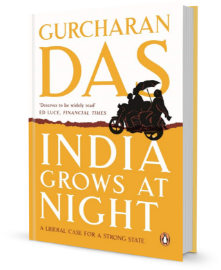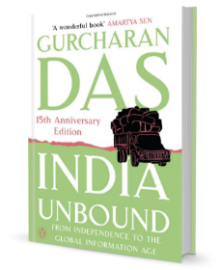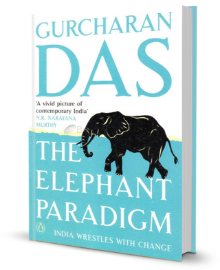

India Grows at Night - A Liberal Case for a Strong State
Indians wryly admit that ‘India grows at night’. But that is only half the saying, the full expression is: ‘India grows at night… when the government sleeps’, suggesting that the nation may be rising despite the state. India’s is a tale of private success and public failure. Prosperity is, indeed, spreading across the country even as governance failure pervades public life. But how could a nation become one of the world’s fastest-growing economies when it’s governed by a weak, ineffective state? And wouldn’t it be wonderful if India also grew during the day—in other words, if public policy supported private enterprise? What India needs, Gurcharan Das says, is a strong liberal state. Such a state would have the authority to take quick, decisive action, it would have the rule of law to ensure those actions are legitimate and finally, it would be accountable to the people. But achieving this will not be easy, says Das, because India has historically had a weak state and a strong society.
-
1)"Das has written a timely book that deserves to be widely read. And it has its share of hard-headed proposals....Simply calling for less government is no answer, says Das. It needs also to be strong. Indian capitalism needs an honest referee...India has much to celebrate nowadays but also faces a cacophony of institutional challenges....Das's core argument is right and urgent."
--Financial Times, London, 25 January 2013. -
2)"Why should it take us 15 years to get justice in the courts or 12 years to build a road?' argues Gurcharan Das.…You need a strong state and a strong society, so the society can hold the state accountable. India will only get a strong state when the best of society join the government and China will only get a strong society when the best Mandarins go into the private sector."
-- New York Times, (by Tom Friedman) , 6 February 2013 -
3) "The book raises some excellent questions...India is an open tolerant country. So why does liberalism not flourish there? Mr Das insists that liberal ideas offer the clearest answer to many of India's woes. Corruption, for example, will not be beaten with a big, new authoritarian bureaucracy, as anti-graft protesters want. Instead discretionary powers must be wrested from dodgy bureaucrats and politicians, the state made smaller, and markets allowed, openly and freely...Mr Das's celebration of liberalism is admirable."
--The Economist, London, 10 Nov 2012 -
4)"The prominent pro-market intellectual, Gurcharan Das, argues that India's rapidly growing middle class should resurrect Swatantra, or form a new party infused with its spirit."
--The Wall Street Journal, 27 February 2013 -
5) "The former CEO of Procter and Gamble in India, who has become one of the country's leading intellectuals, has written a spirited, intelligent book about how to his country moving again. The most interesting book on India that I've read in a while.
--Fareed Zakaria, CNN-GPS, January 19, 2014 -
6)" I now regard Das as the most perceptive analyst of contemporary India... Das suggests, while capitalism is developing, the 'dharma' of capitalism has been given short shrift. This 'dharma' is more than just the 'rule of law'. It is a combination of transparent and efficient governance and 'trust' between the various segments of society and the market. It is a liberal cause that Das espouses. Indeed, the book's subtitle could well have been reversed. Das makes out a 'liberal case for a strong state' as much as he makes a 'strong case for a liberal state'. At the least, a liberal and strong state must deliver...transparent and rules-based decision making in government with no arbitrary powers being vested in government officials and ministers, and a speedy and efficient justice delivery process. An arbitrary executive and a slothful judiciary have given a bad name to governance. He suggests that the first step has to be the creation of a powerful liberal voice and platform and he seeks inspiration from the now defunct Swatantra Party. A second best would be for India's national parties to, in fact, walk their talk about being truly democratic parties with liberal principles. That is clearly a national project worth pursuing and Das's book would inspire anyone who feels this way."
--The Telegraph, 15 February 2013. -
7) "It is hard to disagree with Das's bullish take on the future of the subcontinent. Indian middle classes are on the rise, and are increasingly becoming an interest group in their own right. As they grow in size, wealth and respectability, they will have a greater say in Indian politics and hopefully push for reforms improving government effectiveness and accountability."
--Mint / WSJ, 14 November 2012. -
8) "The eclectic mixture of mythology, history, sociology and economics is overwhelming, but the reader can't disagree with Das's prescription of a strong liberal Indian state."
--Hindustan Times, October 26, 2012 -
9) An Indian political pamphlet of the 21st century....Das moves swiftly across centuries and continents, between anecdotal evidence and occasional factual detail, to outline his liberal case for a strong state. The essence of this argument is that while India has grown over the last two decades the state has not kept pace. And he does not see this as a recent phenomenon but a part of a longer term reality.
--The Hindu, 10 December 2012. -
10) Offers one significant new twist for the global discussions on markets and states.... While the Western world wrings its hands about the loss of the moral on the way to the market, Das celebrates and promotes the discovery of a new version of an old moral compass, driven by and supportive of the market....If the state enables the market, the market will reshape society, and the weak state will become strong, in the sense of being compelled by public aspiration to push back on the illiberal aspects of the social order....In the end, this may be the underlying point of the book: the social system for shaping both markets and states toward development begins with the individual enterprise of introspection.
-- Caravan(Jessica Seddon), 1 December 2012.



